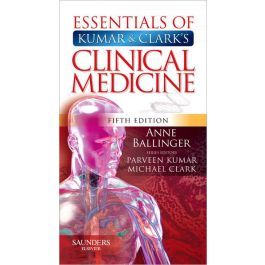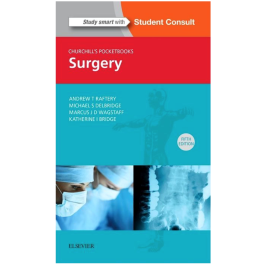Essential Surgery International Edition, 5th Edition: Problems, Diagnosis and Management With STUDENT CONSULT Online Access
by Clive R. G. Quick, Joanna B Reed, Simon J.F. Harper, Kourosh Saeb-Parsy, Philip J. Deakin-
Paperback
$42.40
Essential Surgery is a comprehensive and highly illustrated textbook suitable for both clinical medical students as well junior surgical trainees, preparing for postgraduate qualifications in surgery such as the MRCS. Covering general surgery, trauma, orthopaedics, vascular surgery, paediatric surgery, cardiothoracic surgery and urology, it incorporates appropriate levels of basic science throughout. The book is ideal for modern clinical courses as well as being a practical manual for readers at more advanced levels. Its main aim is to stimulate the reader to a greater enjoyment and understanding of the practice of surgery.
•Essential Surgery incorporates a problem-solving approach wherever possible, emphasising how diagnoses are made and why particular treatments are used.
•The pathophysiological basis of surgical diseases is discussed in relation to their management, acting as a bridge between basic medical sciences and clinical problems.
•The uniformity of the writing style and the clarity of elucidation will encourage continued reading, while the emphasis on the principles of surgery will enable a real understanding of the subject matter.
•The book’s extensive use of original illustrations, boxes and tables emphasises important concepts and will aid revision.
•The principles of operative surgery and perioperative care are explained together with outlines of common operations, enabling students and trainee surgeons to properly understand procedures and to participate intelligently in the operating department.
•A major revision of the text has taken full account of the progressive evolution of surgery and includes new concepts that have advanced medical understanding.
•New topics have been added to ensure the book’s contents match the curriculum of the UK Intercollegiate MRCS examination, including patient safety, surgical ethics, communication, consent, clinical audit and principles of research.
•The broad experience of surgical teaching and training of two new authors has brought a fresh perspective on the book’s contents and its presentation.
•New consensus guidelines for managing common disorders have been incorporated where appropriate.
Review
Awarded First Prize British Medical Association Book Awards 2008 "This is the best undergraduate surgical textbook I have seen for a long time. It may contain less detail than some of the classic texts but it is well-balanced for the current medical course. This is a book to be read and studied rather than a synopsis or aide mémoire to surgery to be carried in the pocket. There is of course a market for both but I would see this as being the more useful especially as the purchase price includes web access to the book. This is the book I will now be recommending to my students!"
"The Fourth edition has been revised extensively. There is an excellent new chapter on screening...The book is divided into four major sections, the largest of which describes the symptoms, diagnosis and management of surgical problems in a traditional disease-based approach. The individual chapters are consistently well written and superbly illustrated." British Journal of Surgery 2009; 95; 535
Table of Contents
PRINCIPLES OF SURGICAL CARE
Mechanisms of surgical disease and surgery in practice
Managing physiological change in the surgical patient
Immunology, inflammation and infection
Shock and resuscitation
Imaging and interventional techniques in surgery
Screening for adult disease
PERIOPERATIVE CARE
Preoperative assessment
Medical problems
Blood transfusion
Diagnosis and management of common postoperative problems
Principles of operative surgery
Complications of surgery
Principles of cancer management
Principles of transplantation surgery
PRINCIPLES OF ACCIDENT SURGERY
Major injuries
Head and maxillofacial injuries
Soft tissue injuries and burns
SYMPTOMS, DIAGNOSIS AND MANAGEMENT
Non-acute abdominal pain and other abdominal symptoms and signs
The acute abdomen and acute gastrointestinal haemorrhage
Gallstone diseases and related disorders
Peptic ulceration and related disorders
Disorders of the oesophagus
Tumours of the stomach and small intestine
Tumours of the pancreas and hepatobiliary system
Pancreatitis
Appendicitis
Colorectal polyps and carcinoma
Chronic inflammatory disorders of the bowel
Disorders of large bowel motility, structure and perfusion.
Anal and perianal disorders
Thoracic surgery
Hernias and other groin problems
Disorders of the male genitalia
Symptoms and signs and investigation of urinary tract disorders
Disorders of the prostate
Tumours of the kidney and urinary tract
Stone disease of the urinary tract
Urinary tract infections
Congenital disorders and diseases secondarily involving the urinary tract
Pathophysiology, clinical features and diagnosis of vascular disease affecting the limbs
Managing lower limb arterial insufficiency, the diabetic foot and major amputations
Aneurysms and other peripheral arterial diseases
Venous disorders of the lower limb
Cardiac surgery
Disorders of the breast
Disorders of the skin
Lumps in the head and neck and salivary calculi
Disorders of the mouth
Disorders of the thyroid and parathyroid glands
Acute surgical problems in children
Non-acute abdominal and urological problems in children






